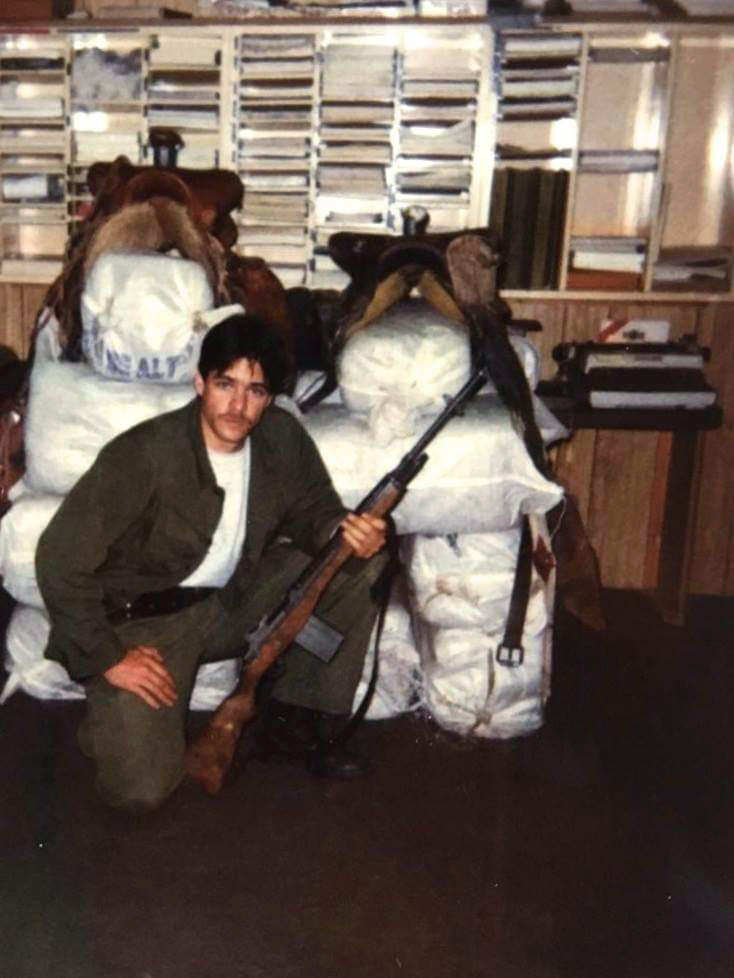
HAVRE, Mont. (BP) – A moral dilemma and Ed Litton led Chris Richards to follow Jesus. Today, he pastors two churches in north-central Montana. (See today’s related story.)
Richards was 26. He’d been a Border Patrol agent for six years, where “Honor First” is the agency’s motto. The Border Patrol’s job is to secure the borders of the United States by detecting and preventing illegal aliens, terrorists and terrorist weapons from entering the United States, and preventing the trafficking of people and contraband.
His dilemma came after a drug bust when Richards watched his supervisor take a large bag of cash seized in the bust and put it in his vehicle. Later the supervisor took it to his office rather than securing it in the evidence locker. Before the Drug Enforcement Administration could arrive to take possession of it, Richards knew the supervisor had helped himself to some of the money.
“There was nothing I could do,” Richards said. “It would have been his word against mine, and the only evidence I had was circumstantial. The whole thing weighed heavy on my conscience.”
His grandfather homesteaded in southeast Arizona in the early 1900s. Richards grew up the child of a horse-shoer and feedlot cowboy and learned right from wrong in his Catholic upbringing. His frustration over the dilemma spilled out that evening in a conversation with his neighbor Don McCormick, a Baptist. It was in that conversation that Richards heard the Gospel and was forever changed.
That led to an invitation to Mountain View Baptist Church in Tucson, where Litton – now pastor of Redemption Church in Saraland, Ala., and Southern Baptist Convention president – was pastor. Richards said the first sermon he heard Litton preach was deeply moving.
“I melted under the enormity of what Christ had done to forgive my sin,” Richards said. “I knew it to be true, that I couldn’t earn my way to heaven. Christ did it for me.”
Today in retirement from the Border Patrol, Richards pastors two Southern Baptist congregations in north-central Montana: Immanuel Baptist Church in Havre since 2015, and since 2018, Chief Cornerstone Community Church in Box Elder, on the Rocky Boy Indian Reservation.
With the border crisis garnering national headlines, Richards opened up about what he observed as he rose in the ranks from a 20-year-old trainee in 1986, to chief patrol agent of the Havre Sector in 2013.
In 1986, then-President Ronald Reagan signed into law the Immigration Reform and Control Act, making it illegal for employers to hire illegal immigrants. The law also made any immigrant who’d entered the country before 1982 eligible for amnesty.
“This law gave people from Mexico and Central America more incentive to enter the United States illegally,” Richards said, adding that at times, Border Patrol was “overwhelmed.” Border crossings only grew during the Clinton Administration in the ‘90s.
“The work was incredibly exciting,” Richards said. “At night we would lay on trails leading from the border and ambush drug smugglers carrying drugs on horseback. We’d use portable ground sensors to alert us that they were coming, but on those still, cold nights, we could hear them a mile away.”
In 2007, Richards transferred to Havre, Mont., 40 miles south of the Canadian border, as the deputy chief patrol agent.
“There’s not a lot of illegal border activity on the Montana border but we had a few smuggling cases,” Richards said. “During my tenure we focused on illegal traffic traveling east and west, particularly on the train. … On one occasion we apprehended a Somali man who had been convicted of providing material support to a foreign terrorist organization, and was on the run.”
Montana’s “Big Sky Country” includes seven Indian reservations: Crow, Northern Cheyenne, Fort Peck, Fort Belknap, Rocky Boy, Blackfeet and Flathead. Mexican drug cartels use these reservations as a base of operations, Richards said.
“Mexican drug cartels are big into meth, and the reservations are a target for them,” he said. “We invested heavily in our intelligence unit to help identify the trends these organizations use to try and curtail the smuggling of both meth and human trafficking.”
In 2008, Richards took advantage of leadership training the U.S. Customs and Border Protection provided.
“I learned that authentic servant leadership is the best leadership model for any organization,” he said. “Unfortunately, not everyone has it within them to be a servant leader. This is where genuine Christian character intersects with effective leadership. If it’s about you, it’s not leadership.”
After a two-year assignment in the nation’s capital, Richards was promoted and, by God’s grace, sent back to Havre as chief patrol agent in 2013.
He returned home to find his home church on the verge of closing its doors. Two years later, at age 49, he retired from his Border Patrol position to become a full-time pastor.
“Sometimes I feel like we’re on the front lines of battle, and there’s always temptation toward discouragement,” he says of pastoring. But, he added, “the Gospel is the only answer.”






















